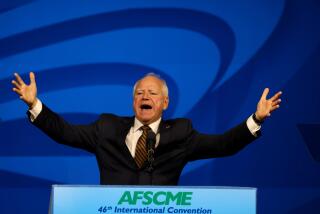For Bush, Race Becomes a Question of the Heart
- Share via
Ever since his campaign began, George W. Bush has tried to shuck one central notion: that he doesn’t have the brains for the job.
But campaign officials recently have worked to head off a second “Wizard of Oz”-style problem: that he doesn’t have the heart for a tough campaign.
“We’ve heard this all before. He doesn’t have enough Washington experience, he’s not smart enough, now he’s not campaigning hard enough,” said Scott McClellan, a Bush spokesman. “This campaign will be won on issues and ideas.”
Suggestions that Bush lacks drive have popped up time and again since January, when he was blindsided by Sen. John McCain’s frenetic New Hampshire campaign.
The issue bubbled up again last week as Bush responded to the end of the Democratic National Convention with a single stop in Tennessee, after which he returned to Texas to jog at a favorite athletic club.
Looking ahead, Bush’s tentative schedule leading up to Labor Day also indicates that he will only be on the campaign trail four days a week.
Bush officials, hit by questions about his zest for the hustings, produced a statistical tally of his campaign stops last week that suggested he was working harder than Gore. What followed was a comical daylong exchange, with each campaign trying to one-up the other.
Voters “like fighters,” said Stuart Rothenberg, editor of a nonpartisan political newsletter based in Washington. “They liked Bush better when he was fighting. [Bush] wants to avoid the appearance that he is more interested in jogging than overseeing education policy.”
In part, Bush himself is responsible for the notion that he keeps a light schedule.
As Texas governor, Bush rarely put in more than eight hours at the office. He routinely scheduled a two-hour midday break to go jogging down by Town Lake, which runs through the center of Austin, according to scheduling records obtained by The Times under public record laws.
He likes to be in bed early, and he joked on his way to Tennessee last week that the day he delivered his acceptance speech at the Philadelphia convention--the highlight of the campaign--was one of the few days he actually stayed up past 10:30 p.m.
And while Bush certainly has the tenacity to campaign fiercely, as he did after losing the New Hampshire primary, he also craves the comforts of home.
There are few things that make Bush shine so much as talking about his ranch in Crawford, Texas, for instance, where he is building a new home with wide porches, three bedrooms and views everywhere of the circling prairie.
Earlier this year, heading into the July 4 weekend, he told reporters on his campaign plane that he was looking forward to a break during the Democratic convention in Los Angeles.
“I really want to go to my own place. My own bed, my own house, my own dog. That’s what I’m going to do,” Bush said. “I enjoy being by myself. I enjoy being out on the land.”
Bush officials defend his schedule, saying it’s a careful balance between getting out their message and making sure that Bush doesn’t get tired.
And, they say, Bush plans to campaign long and hard this fall. They said candidates who underestimate him--see former Texas Gov. Ann Richards and former foe McCain--do so at their own risk.
In the last few days, Bush has done as many as six events a day, including local television interviews, fund-raisers and campaign rallies. All told, he and his running mate, Dick Cheney, will visit 19 states in August by the end of the month, 16 of them won by Clinton in 1996.
“This comes up every time the polls get close,” said one Bush official, pointing to recent figures showing Gore closing the gap with Bush. “It’s a non-issue.”
It was last raised during the primary season. Polls in the winter and spring consistently showed that voters believed Bush had worked less than other candidates. Yet he became the GOP nominee, heading a party more united than at any time since the 1980s.
As long as Bush is effective in getting out his message, especially through television, his campaign schedule may not make much of a difference this fall, GOP strategists said.
Ken Khachigian, a top official in both of President Reagan’s presidential campaigns, recalled that, due to his age, Reagan was dogged by questions about his appetite for campaigning.
The charge didn’t stick, Khachigian said, because Reagan’s handlers made sure to mount at least one event a day, enough to gain footage on nightly newscasts.
“As long as Bush is getting his message out, articulating what he wants, I don’t think it matters that he is not bouncing around the states like Al Gore is,” Khachigian said.
Still, one thing campaign stops are good for is generating attention on local television stations and in newspapers.
The candidate who makes the most stops gets the most coverage. If Bush tuckers out, that could make a difference in smaller, closely contested states such as Missouri and Kentucky.
“That’s the major concern,” Rothenberg said. “Look, you only have three months to campaign. You want to shake as many hands as possible.”
More to Read
Get the L.A. Times Politics newsletter
Deeply reported insights into legislation, politics and policy from Sacramento, Washington and beyond. In your inbox twice per week.
You may occasionally receive promotional content from the Los Angeles Times.










